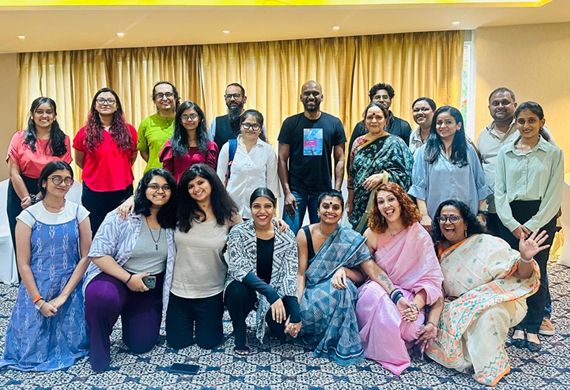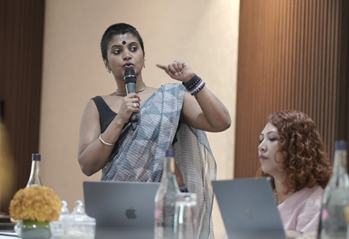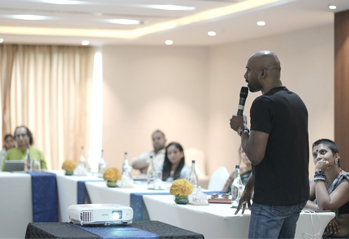
Modern India Needs to Understand Complexities of Gender Identities to Foster True Inclusivity
By: WE Staff
Considering the significance of all-encompassing gender inclusivity in today’s times, it is critical for businesses to truly grasp the complexities of inclusion. A recent event conducted by AnitaB.Org discussed the role played by language in impacting inclusion. Read on to learn more about the event and the thought-provoking conversation.
On May 29, 2024, a thought-proving workshop focused on ‘Gender Inclusivity in Modern India: The Importance of Language’ took place at JW Marriott Hotel, Bengaluru. Organized by AnitaB.Org, the event was hosted by Shreya Krishnan, MD, AnitaB.Org India. Shreya is a CSR specialist and a Corporate Grooming Consultant while also having a foot in different positions as an NLP Practitioner and Gestalt Master Therapist. At the event critical topics were discussed including gender identities, unconscious biases hidden in language, lived experiences of participants from the LGBTQI+ community, etc. The objective of the conversation was to emphasize the true power of diversity and inclusion.
Women Entrepreneur Review Team attended the workshop, partaking in the conversations between the hosts, attendees, and other representatives of the media. Throughout the workshop, Shreya served as a speaker along with Suresh Ramdas, Learning & Talent Development Manager at Publicis Sapient, captivating the audience with their powerful speech on the importance of the written in addition to spoken words via the media lens.
Words And Gender: Contrasting Interpretation
 At the beginning of the workshop, Shreya stated, “The power in diversity and inclusion is to understand that differences exist. We believe that words matter and words are as biased as they come.”
At the beginning of the workshop, Shreya stated, “The power in diversity and inclusion is to understand that differences exist. We believe that words matter and words are as biased as they come.”
As an example, she talked about words having different meanings and connotations for different genders; words such as ‘Ambition, Shame, Guilt, and Confidence’, are interpreted differently in the context of different genders.
She added, “When we think about the language that we communicate very often, there's very unconscious bias that's written into that language that's deep-seated within us. Language often contains unconscious biases that are deeply ingrained. We've all internalized patriarchy and the structures we've been raised in. It takes awareness and education to change the narrative and see it from perspectives other than our own.”
In order to make the session interactive, Shreya asked questions about ‘Calling out versus calling in’ quizzing, what calling in and calling out mean in today's social media world, to which the audience highlighted things such as posting, ranting, calling somebody out, demeaning someone as response from the audience.
One of the attendees of the event answered, “Calling in works in multiple ways. First, while calling out bigots can be necessary, calling in leads to more lasting change. Second, I prefer calling into coming out. Coming out implies it's on society's terms and a public display of who you are. Calling in is saying, "This is who I am and who I've always been, and now you get to see that.”
Core Concept of LGBTQ+ Community
The attendees of the workshop got the chance to listen to and see real-life stories of some of the people coming from the LGBTQ+ Community, drawing narratives to understand the core concepts about the community.
“The last I heard, 26+ genders exist in the world today. Gender is normally binary; gender is a spectrum. And as long as we understand that gender and sexuality is a spectrum that opens up our minds to be able to accept people of different forms of sexual orientation, different backgrounds, different ways that they come into the world, and yet they're able to see them as a spectrum,” said the speaker.
She added, “From our perspective, there is a lack of awareness about the intersex community. Despite representation and awareness of trans issues, the intersex community is often erased. For instance, Tamil Nadu is the only state in India that has banned operations on intersex babies.”
Mentioning the statistics, Shreya highlighted that ‘1 in every 1,000 children is born intersex’ which is not known to parents because they decide on gender based on the child’s external genitalia, resulting in numerous individuals encountering gender dysphoria while they grow up. She even emphasizes how GLBT became LGBT during the AIDS crisis where lesbians played such an important role in taking over and aiding.
She mentioned, “To give recognition to the LGBT community, it's important to highlight the contributions of lesbians, who have been forerunners in these conversations. Globally, trans people have significantly stepped up, and I believe it should be T-L-G-B to reflect this. While the GLB community is privileged, trans individuals have made substantial progress. Understanding our history and ensuring accurate representation is crucial for recognizing why we are here and the ongoing conversations.”
Language of Bisexuality

Speaking of gender affirmation, Shreya indicates towards a person's experience with a transness, when seeking to affirm someone's gender identity, it's crucial to avoid language such as ‘they were born this gender’ due to the formatted gender identity we have always known as a part of the society. Having excluded the T and calling it LGBIs, in some countries like the UK, bisexual individuals falling under these communities frequently come across discrimination from gay and lesbian individuals.
“For instance, in societies where there's pressure to conform to heterosexual norms, bisexual individuals may use their bisexuality as a justification for marrying a heterosexual partner. They may maintain long-term relationships with same-sex partners but yield to family pressure to marry someone of the opposite sex, often claiming bisexuality as a rationale,” she mentions as an example.
The entire workshop has highlighted the challenges faced by the LGBTQ+ community along with understanding the language of bisexuality and different perspectives of divergent people all across the world. With the hosting of the event, AnitaB.Org has made people comprehend the distinctions and variations.






